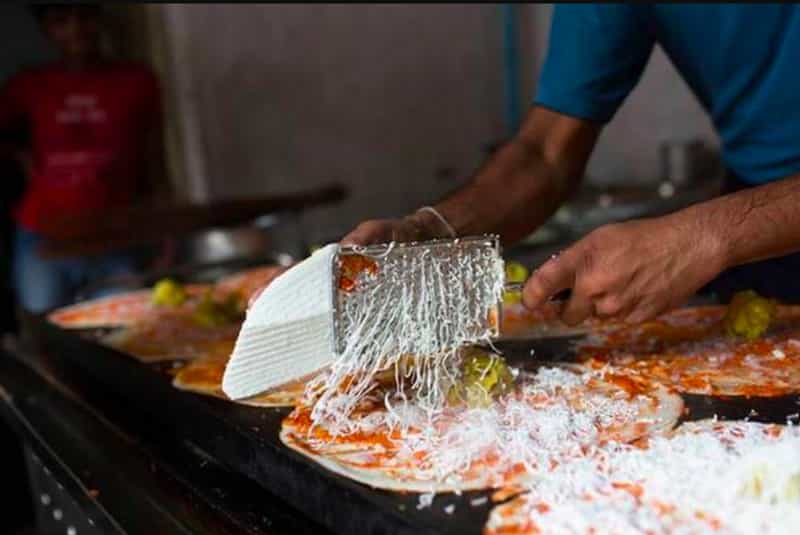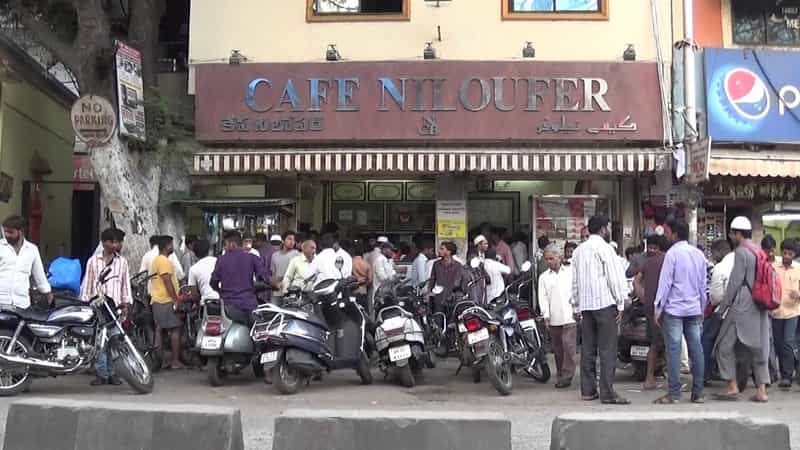Breakfast is no doubt the most important meal of the day. It provides you with all the nutrition and energy to tackle whatever surprises might be thrown at you later. Grabbing a good early morning meal is an excellent way to get a headstart on your day. We have compiled a list of the top breakfast places in Hyderabad that’ll give you a reason to want to wake up early. Here are out recommendations
Best Breakfast Places in Hyderabad: Budget
1. Ram Ki Bandi

Ram Ki Bandi serves some delicious dosas and is considered to be the best dosa point by many in Hyderabad. Ram Ki Bandi is a small pushcart that manages to put a smile on each of its customer’s faces. The dosas and idlis are delicious. The place opens up as early as 3 am and continues serving dosas and idlis till 8 am. You really have to get up early to catch a bite at Ram ki Bandi.
- Recommended Eat: Cheese and butter dosa/idli
- Cost for two: Rs 150
- Address: Opposite Karachi Bakery, Mozamjahi Market, Nampally, Hyderabad
Suggested to Read : 20 Examples of The Best Food in Hyderabad
2. Pragati Tiffin Centre

The Pragati Tiffin Centre is located just opposite Pragati College and students are always seen surrounding the shop. This is one of the hidden gems in Hyderabad that serves some mouth-watering variants of dosas and idlis. For just a Rs 100, you can get an entire meal that will leave you satiated for a while – hence its popularity with students. Try the stuffed dosas, filled with paneer or other delicious stuffings.
- Recommended Eat: Paneer dosa, butter dosa
- Cost for two: Rs 150
- Address: Opposite Pragathi College, Sultan Bazar, Hanuman Tekdi, Koti, Hyderabad
3. Café Niloufer

The cafe opens as early as 4 am to serve its patrons piping hot tea. The cafe opened in 1975 and has since been delighting its customer with its Irani style. The Irani Chai and puffs are must trys here. The cafe is also famous for its Osmania Biscuits and Malai Bun that are made fresh every day in the bakery. They also serve cakes and pastries in their confectionary section.
- Recommended Eat: Irani Chai and the Malai Bun
- Cost for two: Rs 150
- Address: Red Hills, Near Niloufer Hospital, Lakdikapul, Hyderabad
Best Breakfast Places in Hyderabad: Mid-range
1. Wofl

Wofl probably serves the best waffles in Hyderabad. Their menu is not restricted to just waffles. There are also other western breakfast dishes. Some of the food served here includes burgers, pizzas, hot dogs and some lip-smacking omelets. Wofl has three locations throughout Hyderabad and you can grab a bite any of these outlets – their quality and taste are always consistent.
- Recommended Eat: Blueberry waffle, cheese, and mushroom French toast
- Cost for two: Rs 700
- Address: Multiple outlets throughout Hyderabad
2. The Roastery Coffee House

The Roastery Coffee House is one of the only gourmet cafes with a specialty coffee roaster in Hyderabad. It is a blend of specialty coffee mixed with artisanal coffee. The cafe has been converted from a house and exudes a homely and warm vibe. This is one of those places you visit when you want to have a great view along with a great breakfast.
- Recommended Eat: Coffee, spinach corn sandwich, cappuccino, chicken sandwich
- Cost for two: Rs 700
- Address: House 418, Road 14, Banjara Hills, Hyderabad
Also Read : Romantic Restaurants In Hyderabad
3. Chutneys

The eponymous restaurant serves some of the best South Indian vegetarian food in Hyderabad. The restaurant has eight locations all throughout Hyderabad with the taste being consistent across all outlets. The unique selling point of Chutneys is the different kind of chutneys it serves, along with the regular food. The chutneys include coconut, mango, tomato, chili, etc. You are guaranteed to leave chutneys licking your fingers.
- Recommended Eat: The Guntur Idli with the various chutneys
- Cost for two: Rs 800- 1000
- Address: Multiple locations throughout Hyderabad
4. Minerva Coffee Shop

True to its name, Minerva coffee shop offers some of the best South Indian coffee in the city. The interiors of the shop are minimalistic and they haven’t changed it much since its inception. The cafe is known for its South Indian dishes that gather immense crowds from all over the city. The cafe also serves as a nostalgic cafe for many people.
- Recommended Eat: The filter coffee and the vadas
- Cost for two: Rs 800- 1000
- Address: Multiple locations throughout Hyderabad
5. Beyond Coffee

Beyond Coffee is a restaurant that combines a boutique art gallery with a cafe. The restaurant has a spectacular ambiance and offers a great experience. The restaurant is an indoor space complete with a green patio and a terrace. There is no better way to start a day than sitting here and sipping on your chai. A plus point of visiting this restaurant is that you can try their killer pasta as well.
- Recommended Eat: Cutting chai and the Donatello Pizza
- Cost for two: Rs 850-1250
- Address: Multiple locations throughout Hyderabad
6. Bikanervala

Bikanervala offers a fresh North Indian perspective on breakfast in Hyderabad. The place is home to some of the best parathas in the city that will leave you licking your fingers. There are other offerings such as chaat and samosas that also hit here. Bikanervala provides breakfast buffets where you can come and eat to your heart’s content.
- Recommended Eat: Gobi mooli paratha
- Cost for two: Rs 1000
- Address: Basheer Bagh and Banjara Hills
Check Hotels In Banjara Hills Hyderabad
7. Ofen

Ofen is a restaurant serving up typical American and Continental breakfasts. The place is known to be visited by many health-conscious people who are looking to have a nutritious as well as a satisfying meal. Their breakfast platter is well known to many and people come here from all over the city to catch a bite.
- Recommended Eat: Pancakes and sandwiches
- Cost for two: Rs 1000
- Address: Road 10, Banjara Hills, Hyderabad
Also Read : A Complete List of Things & Places Hyderabad Is Famous For
8. Truffles Café

This is a cafe that is known for its late breakfast options for those who don’t get up to catch the early morning rays. Their breakfast rolls and bacon rolls are surely the best way to begin your day. The cafe bakes their bread and rolls fresh daily, which is favorites with the customers.
- Recommended Eat: Crispy bacon roll, hash browns, and eggs
- Cost for two: Rs 1200
- Address: Plot 376, Road 10, Jubilee Hills, Hyderabad
Best Breakfast Places in Hyderabad: Premium
1. Seasonal Tastes The Westin

Seasonal Tastes at The Westin lets your breakfast like a king. The place offers you innumerable breakfast options and also offers a generous breakfast buffet. Although a little pricey, you have to visit Seasonal Tastes to truly experience one of the best breakfasts in Hyderabad.
- Recommended Eat: Sandwiches and the pasta
- Cost for two: Rs 2500
- Address: The Westin, Mindspace IT Park, Hitech City, Hyderabad
Also check Hotels In Hitech City Hyderabad
So the next time you’re in the mood for an early morning outside meal, do check out these breakfast places in Hyderabad and let us know of your experiences in the comments section below.
Reserve cost-effective and reliable hotels in Hyderabad now!























